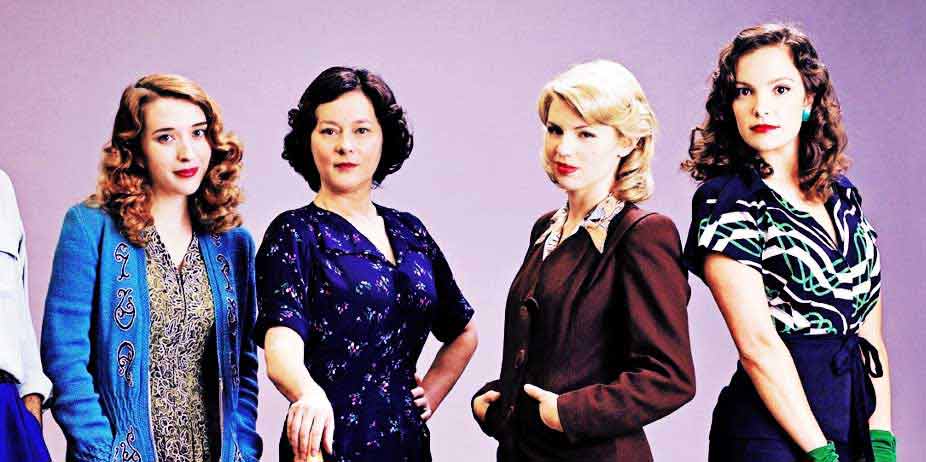
Bomb Girls, Season One (2012)
Ever since the "Beeb" (BBC) decided that corset dramas were passé, the British television focus has turned to WWII dramas. Some of them are tight little murders solved by no-nonsense police constables, others deal in the semantics of midwifery post-war, and then there is Bomb Girls, about the female workforce. Unfortunately, this was too heavy on the soap opera and not insightful enough into the struggles of the period for my taste.
Rich upper-crust Gladys (Jodi Balfour) cannot wait to get out of her pumps and onto the stone floor of the local bomb-making factory, where she intends to rub shoulders with other working girls and "do something worthwhile" with her time. Her uppity parents are totally against it and insist on her doing office work, but it doesn't take her long to decide that answering phones is hardly important. Casting aside her scarves but keeping her bold red lipstick, she joins the girls on the production line. Not that all of them are happy to have her there, mind. She is high class after all. Her competition for best employee is the blond bombshell Betty (Ali Liebert), who hides her lesbianism from the prejudices of the day while secretly pining for Kate (Charlotte Hegele), a deeply scarred redhead frantic to avoid her tyrannical Bible-thumping father from finding out where she has gone. Then there is Vera (Anastasia Phillips), who soon winds up in hospital after an accident, and the floor matron, Lorna (Meg Tilly). With a crippled husband at home and two sons in the current war, her constant feuding with the only Italian in the business often throws a wrench in her supervision over her "girls."
It's a tough life where one mistake can blow you all to kingdom come... and these girls make plenty of mistakes; if not at work, then in their personal lives. Gladys dabbles with a man other than her intended with potentially disastrous consequences; Vera must contend with a life-altering scar on her face; Kate is struggling to overcome lifelong abuse and figure out her place in the world, while forming a socially-frowned-on friendship with a black man; and Betty is angry when the others paint her as the perfect housewife for an advertising campaign.
I wish I had liked this series more, but its more interesting plots seemed to be sidelined in favor of sexual entanglements. The women are all surprisingly sexually liberated for the 1950's, but all the chauvinism of the period remains in the men, leaving an imbalance that the scripts can't quite counteract. It is kind of a shame that so much time is spent on these shenanigans, because the secondary plots are often more interesting -- particularly Vera and her trials in the hospital, as she tries to reconcile her new life with the past one and move forward toward hope. Part of the problem is that the lesser characters are stereotypical and that removes any element of surprise; we expect that Gladys' parents will be pretentious snobs... and they are. We expect her to cheat on her boyfriend... and she does. We figure that all that hatred Lorna has for the Italian is sexual tension... and it is. We know Kate's father will turn up at some point... and he does.
Truthfully, I think that Call the Midwife has somewhat ruined me, in terms of 1950's period pieces. Once you have witnessed profound acts of love entwined with faith, forgiveness, and healing; once you have seen the miracle of life played out against the war-torn streets of London, and spent some time with the wise, funny, and likable women of Nonnatus House, other dramas fall short by comparison. This one simply did not touch my heart.
Sexual Content:
Several instances of premarital sex (conversation,
undressing, groping); a woman puts her hand down a man's
pants and engages in heavy-duty kissing in an alley (it's
implied it goes further; she later denies it); a man
confesses to having slept around to get "practice" for his
wedding night; a married woman conducts an affair behind her
husband's back (passionate kissing, necking, undressing); a
lesbian kisses another woman, who violently rejects her; the
final episode ends on a woman having sex with her husband
(some movement).
Language:
Occasional profanities, abuses of deity, and common vulgar
terms.
Violence:
Accidents and fisticuffs; an explosion goes off badly
injuring some men (bloody injuries shown); the worst is when
a woman's scalp is ripped off via a piece of machinery (we
see it come off from a distance, and hang there in midair,
then see her badly damaged / scarred face).
Other:
One character's father is a Bible-toting preacher who beats
and brutalizes his kids. A character intends to commit
suicide and stores up pills to do so, but gives them to a
friend to help ease his passing instead.
